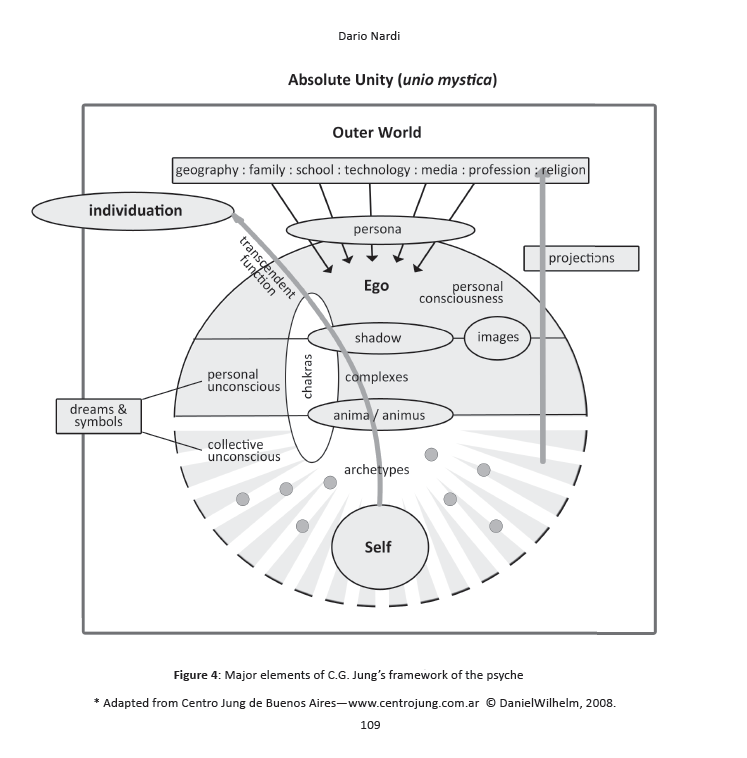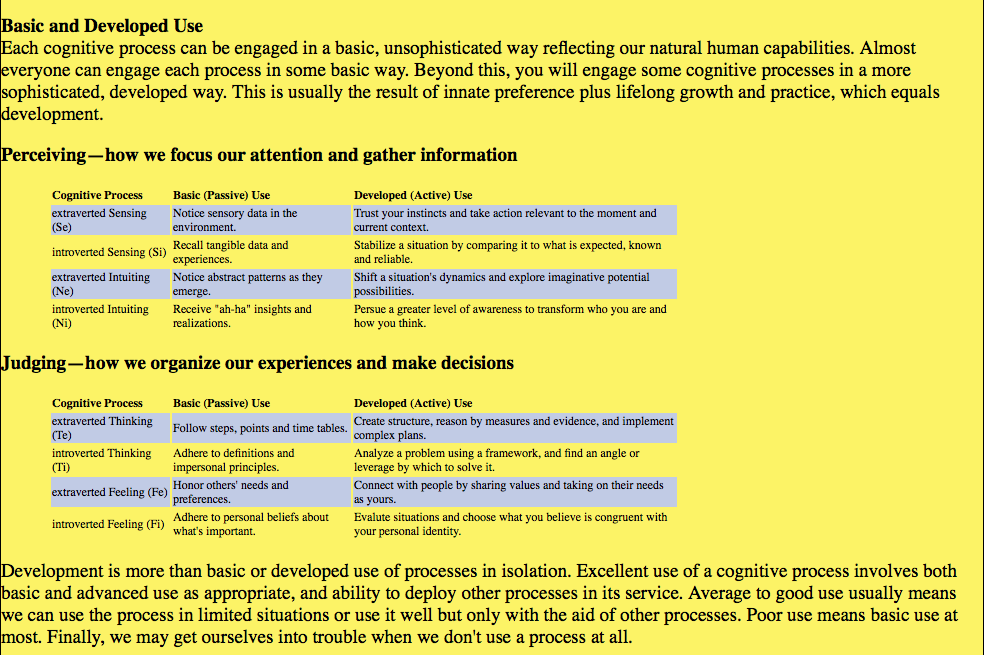Do you ascribe to the belief that the top four functions always follow the specified order or do people sometimes possess a group or order that is outside the "norm" of the theory.
Great question. A huge can of worms! Tasty worms, so long as we apply "ketchup" (aka "comfort with uncertainty").
There continues to be a schism within the professional type community, though it's clearly swayed in one direction for a while now.
To clarify what we're talking about, by way of example for INFP:
Standard: Fi, Ne, Si, Te
Alternate: Fi, Ne, Se, Te
Other: Fi, ?, ?, ?
What is a person's "type" really, functionally? Minimally, does a person just have a dominant function, and everything else is there to balance out that one function? Or, minimally, does a person have a dominant+auxiliary pair, and the other 2 functions balance out that pairing? Or, beyond the dominant function, is there really a set order? Maybe it varies by person? Or maybe the set order is typical, but there are individuals, maybe 1%, 5% or 10%, whatever, who differ?
More abstractly, from a modeling POV, is the function-hierarchy a "prescriptive" model or a "descriptive" model? If it's descriptive, it should hold true, ideally up to the limits of error, say 95% of the time. Alternatively, if it's prescriptive, then people may be all over the place, but they're happier and healthier (more "functional") if they follow the hierarchy, whichever hierarchy that is.
I'm in the dom+aux camp, with the 3rd and 4th functions necessarily reflecting one's opposite type. Why am I in that camp? The reasons are multiple, and mostly practical, and I use it as a prescriptive model. That is, people are happier and healthier this way.
Mark Majors has been gathering and analyzing data from his Majors PTI tool and has presented at conferences on this very question. Mark helped developed MBTI Form M at CPP and then went his own way to develop the Majors PTI, which turned out to be a savvy business decision; plus as a professional statistician, the Majors PTI is second only to the MBTI in terms of statistical support, and from what I'm told, it outperforms the MBTI. Anyway, it looks like there is a hierarchy, it's a clear statistical pattern, but it's not true for every person. Of course, this is from assessment data; it's not a person-by-person in-depth investigation, so it's still questionable. What he has NOT resolved is whether the standard or alternate model is the right one! At first Mark said the alternate model won out, but when he shows audiences the data, it's a 1% difference, so he's yet unable, after thousands of data points, to fully answer the question.
On to Jung... Jung didn't really say there are 8 functions. He observed a preference for E or I that could be weak or strong, and he named 4 functions. A person has one of those 4 as dominant, as differentiated into consciousness. How that dominant function plays out in practice looks notably different depending on whether the person prefers E or I. So, INFJ and ENFP both have the same dominant function, iNtuiting, and all that differs is that INFJ is introverted and ENFP is extraverted. This is a slightly different framework than saying there are 8 distinct cognitive processes.
The difference may feel semantic, but I've kept it in mind while analyzing the brain data. And in fact, if I take all my NF subjects and factor their brain wiring data into 2 groups, INFJ and ENFP plainly fall into one group while INFP and ENFJ fall into another group. This is maybe 95% of subjects falling into their group... so maybe Jung's original take is actually correct? That said, there are many other aspects of the brain data, such as flow, that plainly point to 8 distinct cognitive processes. And all the 16 types factor so neatly.
BTW, I tend to explain Type like this:
An able adult needs to both “perceive†and “decide†as well as operate in both the inner and outer worlds. Thus, minimally, we each rely on two processes: either Sensing or iNuiting to perceive plus either Thinking or Feeling to decide. Moreover, we need to use one process in an extraverted way and the other in an introverted way. Thus, for example, a person might prefer extraverted Intuiting (Ne) and introverted Feeling (Fi). Or a person might prefer introverted Sensing (Si) and extraverted Thinking (Te). These pairings
minimally cover all the bases.
Yet, from the thousands of data points from my cognitive processes assessment at
keys2cognition.com, I use something else!
To determine E or I:
E score = Se + Ne + Te + Fe
I score = Si + Ni + Ti + Fi
Whichever is higher wins out. So I'm following Jung's viewpoint here.
Then I look for which PAIR of functions, out of the 8 "allowed" by type, has the highest score.
So maybe Ni+Fe is the highest pairing, or maybe Ne+Ti is the highest or what not.
The assessment scores this way because I tried several scoring methods and this came closest to matching declared type. Maybe not the best reason, but it works, and is essentially a hybrid of what's discussed above.
Finally, when I work with people one-on-one, I give a bit of leeway. For example, by definition, ENFP is minimally Ne + Fi. But beyond that, most adults have several more moderately-develop functions. For introverts, I find 3 introverted functions and 1 or 2 extraverted functions are typical; vice versa for extraverts. So an ENFP might be Ne + Fi, with Fe and Te, plus some Si. But I've met some ENFPs who are Ne + Fi, with Fe and Se, or Te and Se, plus some Si. Or whatever. BTW, I find those less-usual ENFPs tend lead lives that are not so well "sorted", but are perhaps more interesting.... I use this model not because I believe it's true, but because it's a practical way to characterize and work with a person. To work with the ENFP "as if" Te or Fe or Se or whatever is also developed, even if at a deep psychical level, it's not true.
Actually finally, I should clarify that I distinguish "basic" and "advanced" use of a function. I really believe a ton of debate and confusion in the type community could be resolved by making a few simple distinctions like these:


